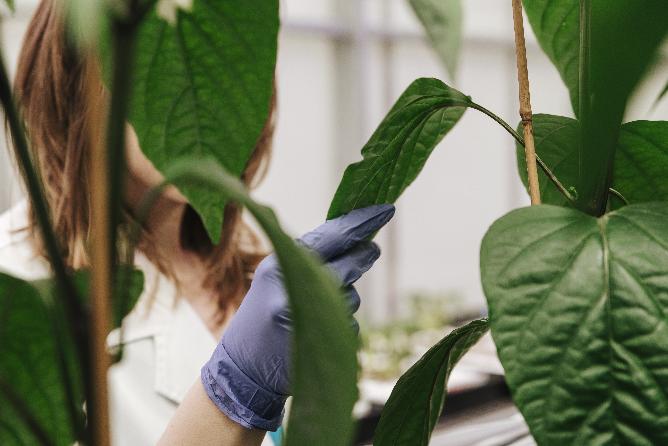Plant Response Biotech has merged with Koch Biological Solutions in the first of a planned series of “rollup” deals for the biological crop input category, AFN can exclusively reveal. Read on to get the scoop on how this deal came about.
Scott Horner and his colleagues at Middleland Capital had been studying biological crop input startups for over three years when they discovered an answer for what’s largely been a struggling category of the crop input industry.
Biologicals are the non-chemical alternatives to the synthetic products that many farmers use to control disease or pests on their farms or promote growth. The hope with these bio-fertilizers and bio-pesticides, examples of which are microbes or plant extracts, is to reduce the negative impacts of applying vast amounts of synthetic or chemical products to the soil and perhaps even improve it. Many biological products companies have struggled to gain traction with farmers on the back of poor performance and subsequent mistrust — the ‘snake oil’ term still abounds. And while the space is in somewhat of a revival mode right now with high profile and well-funded startups such as Indigo Agriculture and Bill Gates-backed Pivot Bio joining the ranks with trendy microbial products, it still has a long way to go, according to Horner.
“After evaluating the sector for many years before doing a deal, we saw there were many one-hit-wonder companies with a single product and no real pipeline.” No one product is going to answer all farmer’s needs. Even more damning, Horner says that few truly understood how their products worked — “the mechanism of action.” This lack of understanding was directly impacting adoption because it meant the companies did not know how their products might interact with other products farmers were already using.
“Ideally biologicals will compete with chemistry but it will be in a phased-in and phased-out approach,” said Horner. In other words, farmers aren’t going to suddenly switch out their whole inputs program because some entrepreneur tells them it will work better; ag retail is a relationship-based business and many farmers have deep relationships with their current providers. But if a biologicals company was to present the opportunity to use a bundle of products, possibly including some the farmer already uses, that might be more palatable.
This dynamic presented Middleland with a significant opportunity to rollup several companies to present the market with a better option. According to Investopedia, roll-up mergers “combine multiple small companies into a larger entity that is better positioned to enjoy economies of scale. Private equity firms use roll-up mergers to rationalize competition in crowded and/or fragmented markets and to combine companies with complementary capabilities into a full-service business, for instance, an oil exploration company can be combined with a drilling company and a refiner.”
Where to start?
Plant Response Biotech. Middleland invested in the Madrid, Spain-headquartered biologicals platform back in 2015 in a round led by Monsanto Growth Ventures. (Shout out to Kiersten Stead for making the intro!) It was the firm’s first biologicals investment.
“What was interesting about Plant Response was the depth of the team’s pipeline and that they knew how everything worked. That really spoke volumes about how they were looking at the world and one of the most important things from an adoption standpoint is that if they know how it works, they know how to deploy it in combination with other products, including chemistry. So if we can leverage what we know about the mechanism of action then we can understand compatibility with other products, biological or chemical.”
Plant Response Biotech is a plant biotechnology company specializing in the innate immunity of plants, and plants’ physiology, and nutrient use efficiency. The company, which was founded in 2008 by two researchers out of Universidad Politécnica, used its deep relationships with other university researchers across the European Union, to get a first look at potential “agents.” (Agents are the active biological compounds that target immunity pathways in plants.) It then developed a screening platform to select which agents were most likely to be effective to move forward into development, creating a deep product pipeline of candidate products, each with defined mechanisms of action.
Horner, who had the rollup strategy in the back of his mind, saw this product screening, or “fast-track” platform, as a tool to screen potential M&A targets.
After several years of focusing on deepening the company’s product expertise but also its commercial expertise — in 2016, it hired ex-big ag and retail Tom Snipes as CEO, with experience in big ag and retail — the company has now made its first rollup move to build out its commercialization platform.
Plant Response + Koch Bio
Today, Plant Response has announced its merger with the biologicals platform of Koch Industries that the chemicals giant is spinning out. Koch Biological Solutions, which is more focused on genetics, develops live microbial and biologically-derived chemistries that aim to improve plant performance at every stage of growth. It uses the Mendel Biotechnology platform Koch acquired in 2014.
Through various modes of action, Koch Bio’s biological solutions perform directly on the plant or its environment to improve crop efficiency and nutrient uptake, maximizing yield potential. It is complementary to Plant Response because it focuses on genetic and whole-plant responses (top and bottom) — also known as the epigenetic control point — while Plant Response focuses on responses at the cellular level (middle). Together, the new company will be able to understand modes of action and plant responses at the genetic, cellular and whole-plant level, and the capability to screen for agents across those levels, according to the new company.
The new entity will be called Plant Response Biotech Inc and leverage both companies’ complementary capabilities, assets and product offerings. It will have 10-12 product lines over the next 12-36 months with a view to closing sales in North and South America as well as EMEA region in 2020, the company told AFN.
“We’re confident in our ability to ramp up commercially quickly,” said Snipes, adding that the plans for the new entity have been very well received with retailers he plans to start meeting with early next month.
Plant Response already has sales of two products in Europe while Koch Bio has sales of its microbial products across the Americas.
“Ag retailers are looking for consolidation as much as financial investors are”
Commercialization is a key challenge in this industry, and Snipes and Horner hope that the merger will create a strong sales force.
“I spent half my career in retail but I know if it weren’t for my relationships, I wouldn’t have got the meetings I did with retailers at Plant Response; they’re looking for consolidation as much as financial investors are,” Snipes told AFN. “There are too many small biologicals companies out there, and lots of investments have raised eyebrows. We’re now in limbo land waiting for someone to break out and get ahead of the pack; this opportunity breaks us out. It is too hard for retailers to separate the good actors from the bad so merging with Koch and others can give us scale and credibility. Building that scale is also necessary as it gives us better access to capital.”
Talking of capital, Koch Industries is investing $11 million in the new entity in a round that existing investors will likely join. A larger round is planned for some time in 2020.
The company will be headquartered in Raleigh, Durham with a deep R&D group based in Koch Bio’s location in Hayward, California. All employees from both companies will be retained.





